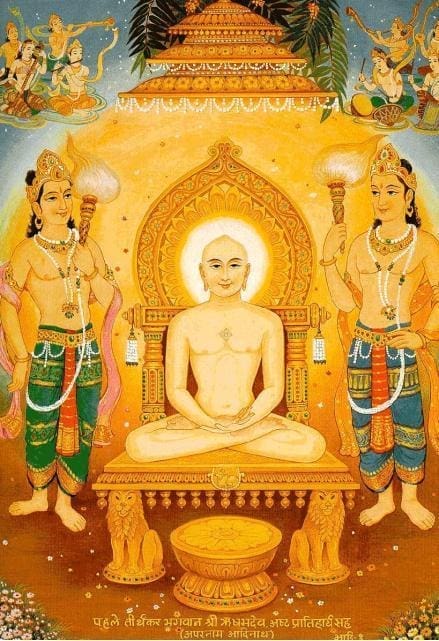
Lord Rishabha was the first Tirthankar of our time, and hence is also called Adi-nath, the First Lord. In Jain tradition, he is more than a Tirthankar. As a king, he is credited with development of several innovations affecting the society, as transition was being made from a simple to a more complex society:
prajaaptiryaH prathamaM jiiivishhu sashaasa
kR^ishsyadishhu karmasuprajaH.
(vR^ihat-svayambhuu stotra)
As first Prajapati, he taught people who wanted to earn a living through various professions.
dhammo vi dayamuulo viNimmiyo aadi bamheNa. (trilokasaara)
The “first Brahma” (Lord Rishabha) established the (ordinary) dharma based on compassion.
The ancient idols of lord Rishaba all show him long shoulder length hair. This is referred to by Acharaya RavisheNa in Padma-PuraNa:
vaatod-dhuutaa jaTaastAAsya rejuraakulamuurtauaH.
dhuumalva iva sad-dhyaan-vahnisaktaya karmaNaH.
Trans: Blowing in the wind, the locks of his hair looked as if they were smoke coming out of the fire burning the karmas.
The Vaishnava text Bhagavata-PuraNa also mentions the locks of hair of Lord Rishaba:
Kutila jatila kapisha-kesha-bhuumibhaaraa.
Rishabaha was the son of King Nabhi and Queen Marudevi. He is mentioned in all the Vaishnava/Shaiva PuraNas, as well as other texts. The Bhagavata says:
ashhTame merudevyaaM tu naabherjaata uruukramaH.
darshayan vartma dhiiraaNaaM sarvaashramanamaskR^itaM.
Trans: In the womb of Merudevi, wife of Nabhi, the lord had his eighth avatara. He showed himself in a form that is to be worshipped by all Shramanas. (Here the author of Bhagavata-PuraNa regards Lord Rishabaha as an avatara).
Bhagavata calls him “shariira maatra parigraha” (body his only possession), “gagana-paridhaanaH” (wearing the sky), vaatarashanaa (wearing the wind).
While some sectarian bias is apparent in some of the non-Jain texts, both Lord Rishabha and his son Bharata are mentioned respectfully in the Hindu Puranas.
Bharata the Chakravarti and Bhaarata-varsha
The oldest son of Lord Ridhabha was Bharata. He was a chakravarti king. In the later part of his life he retired as a monk and attained nirvana. Since he became a siddha, he is occasionally worshipped. According to the Jain tradition, India was named Bhaarata-varsha after him. This is supported by most of the Hindu Puranas. Mr. Dhruva Chakravarti writes:
Other than in Matsyapurana, all Puranas say the same thing about the naming of our land. Svayambhuba Manu had a son called Priyabrata. His son is Agnidhra and his son is Nabhi. Rishabh is the son of Nabhi. Rishabh had one hundred sons. the eldest of them was Bharat and he became king after his father. The land came to called Bharatvarsha after him. SrimadBhagabat says:
Priyabratam nama suto manoh Svayambhubasya yah.
Tasyagnidhrastato Nabhih Rishabhastatsutah smritah.
Abatirnam putrashatam tasyasid Brahmaparagam
Tesham boi Bharato jyestho Narayanaparayanah.
Bikhyatam varshametad yannanma Bharatamuttamam.
According to Kalidas, India was named Bhaarata due to Bharata the son of Dushyanta. This view is however not supported by the Puranas.

Kindly give chapter and verse number for Bhagvatam and Rishab Adi nath. Also please name the scripture that mention Rishab Dev as ADI NATH.
Shah, Umakant P. (1987), Jaina-rūpa-maṇḍana: Jaina iconography, Abhinav Publications, ISBN 81-7017-208-X https://books.google.co.in/books?id=m_y_P4duSXsC&redir_esc=y